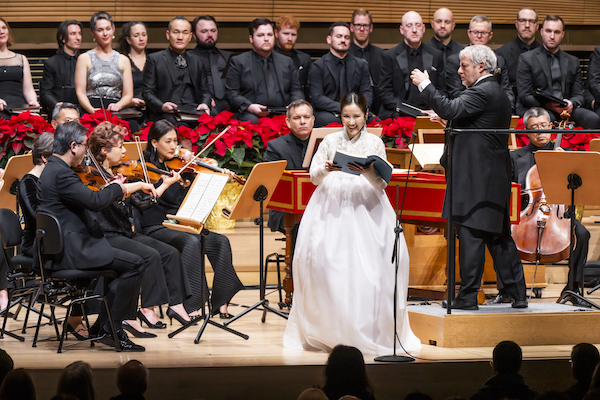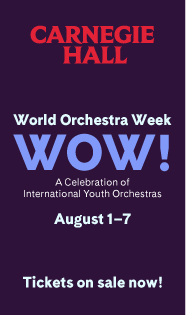Biondi leads Philharmonic in a subtle, stylish “Messiah”

The New York Philharmonic has a winner in the annual Messiah sweepstakes if the capacity audience’s response to the first of four performances on Tuesday evening at David Geffen Hall is any measure. The competition is stiff as choruses, professional and amateur alike, perform Messiah in concert halls and churches throughout New York City and its environs every December.
Yet Handel’s now-warhorse wasn’t always a mainstay of the NY Phil’s repertoire.The orchestra’s first complete Messiah came only in the 1956-57 season with Leonard Bernstein conducting. Purists were unhappy as he rearranged it into two long sections corresponding to Easter and Christmas, rather than Handel’s three-part structure. Among his other innovations were the use of harpsichord in the continuo, instead of piano which was common at the time, and a male countertenor instead of a female alto. Handel used both voice types depending on the musical forces available to him, but the countertenor was all but unknown in mid-20th-century America.
Fabio Biondi took no such liberties in his approach to Messiah. The Sicilian-born conductor is known for an approach which is free from constraints. His quest for what he terms the “original language” has brought him and his period ensemble Europa Galante success in the Baroque, Classical and early Romantic repertoire.
For this Messiah, that translated into a flowing, almost delicate performance, which limned the drama of the work with subtlety, not bombast. The orchestra played modern instruments, of course, save for the harpsichord and portative organ in the continuo. Some may have missed the tang of gut strings and the mellowness of period trumpets and tympani, but the Philharmonic members have a definite affinity with Baroque style. The strings played with finesse throughout, especially in the “Pifa,” or Pastoral Symphony, which evokes the shepherds watching their flocks on the night Jesus was born in Bethlehem.
The Handel and Haydn Society’s connection with Messiah makes the NY Phil seem like a Johnny-come-lately to the scene. The venerable Boston choir sang the “Hallelujah” Chorus at its first concert in 1815 and gave the oratorio’s American premiere in 1818. That tradition which is carried forward with the leadership of Jonathan Cohen, the English cellist and conductor, who is in his first season as H&H’s artistic director and led Messiah performances in Boston last month.
With just 36 singers, the H&H chorus was an integral participant in Biondi’s intimate reading of Messiah. The chorus had the flexibility to sing ever so softly, even with sweetness, as in their light, bright rendition of “And He shall purify.” “For unto us a Child is born” was sung with equal lightness, but with an appealing brilliance, underpinned by rhythmic precision and textural clarity. In the “Hallelujah” Chorus, the sopranos produced sound that rivaled the sheen of the trumpets.
Biondi imparted a remarkable precision to “Lift up your heads, O ye gates.” The full sweep and depth of H&H’s sound was on display from “And the glory of the Lord” to “Glory to God in the highest,” culminating in the sculpted grandeur of “Worthy is the Lamb.”
The four soloists were less homogenous in terms of vocal style and personality. They were, however, united in the beauty of their respective voices, plus their ability to embellish Handel’s musical lines with dexterity and elan.
Soprano Hera Hyesang Park had the air of a diva about her, both in the manner of her singing and elegant appearance. Her sizable lyric soprano brought excitement to the angel’s tidings of the birth of the Christ Child, brilliance to “Rejoice greatly, O daughter of Zion” and fervor to “I know that my Redeemer liveth.” She executed fluid coloratura and delightful trills and turns with aplomb. The soprano was in full opera mode for “If God be for us, who can be against us?”
Theatricality was hardly lacking in mezzo-soprano Hannah Ludwig’s approach to Handel, but it was much more text driven. She has a voice of great beauty, but isn’t afraid to produce harsh, at times growling sounds, to elicit drama. They were employed to great effect in both “But who may abide the day of his coming” and hurling out the words “shame and spitting” in an impassioned “He was despised.”
Tenor John Matthew Myers is cut from more traditional, oratorio cloth. He imparts drama through straightforward delivery and the glory of his voice. These are the exact qualities necessary for the “Comfort ye my people” and the “Ev’ry valley shall be exalted. The most beguiling sounds of the entire performance were Ludwig and Myers singing “O death, where is thy sting?” with Carter Brey playing the obbligato cello solo.
Imposing of stature and voice, Joshua Conyers’s baritone is remarkably rich and sonorous. He did not, however, bring equal drama to the equation. “Thus sayeth the Lord” did not thunder with the requisite authority and in “The people walked in darkness” neither did he convey an essential mystery and gravity. He was almost a different person singing “The trumpet shall sound” which was topped off by thrilling high notes. Perhaps it was the opportunity to engage in a musical dialogue with trumpeter Matthew Muckey that made the difference.
Messiah will be repeated 7 p.m. Wednesday, Thursday, and Friday. nyphil.org
